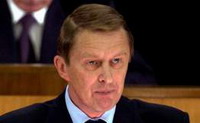Russian presidential contender criticizes Soviet-U.S. arms treaty
Presumable contender to succeed President Vladimir Putin criticized a landmark Soviet-U.S. arms treaty Wednesday as being a "relic of the Cold War", and promised that Russia would get a "sword" to pierce a U.S. missile shield.

First Deputy Prime Minister Sergei Ivanov made the statements during a two-hour news conference at which he commented on a gamut of issues - from global security to children's sports - in what sounded like a presentation of his election program.
Putin has not yet expressed support of any potential contender for next March's election, and Ivanov has not declared whether he will run. However, he and another first deputy prime minister, Dmitry Medvedev, are widely seen as leading candidates being groomed by the Kremlin.
Ivanov, a KGB veteran like Putin, praised the country's growing economic might and military power, saying it now ranks among the world's top 10 economies.
"Russia is one of the leading global powers, and it will remain such not only because of its powerful military but also because of its economy and intellect," he said.
Like Putin, he harshly criticized U.S. plans to deploy elements of its missile defense system in Poland and the Czech Republic, saying that Moscow does not trust Washington's claims that they are intended to fend off potential missile threats from Iran.
"It can't be accepted on serious expert level," he said. "A radar the U.S. is planning to deploy in the Czech Republic will be capable of scanning air space up to the Ural Mountains."
Ivanov said that Russia was not going to build a strategic missile defense system similar to that the United States is developing, but will take "adequate steps" to respond to the U.S. move.
"A more efficient sword can be found for every shield," he said.
Putin and other Russian officials have said that Russia already has missiles that are capable of piercing any potential missile defense and will develop even more powerful weapons.
Ivanov also criticized the Intermediate-Range Nuclear Forces Treaty, signed in 1987 by Soviet leader Mikhail Gorbachev and U.S. President Ronald Reagan. It eliminated an entire class of medium-range missiles then based in Europe.
Ivanov called the treaty "a relic, a rudiment of the Cold War," saying that dozens of nations have developed intermediate range missiles since the pact was signed, and many of them are located close to Russia's borders. However, he stopped short of saying that Russia would opt out of the pact.
Ivanov also defended Putin's move to suspend Russia's observance of another key Cold war-era agreement - the 1990 Conventional Forces in Europe Treaty - which limits the number of military aircraft, tanks and other non-nuclear heavy weapons around Europe.
Putin declared the moratorium over NATO's refusal to ratify an amended version of the treaty amid differences over Russia's troops withdrawal from the ex-Soviet nations of Georgia and Moldova.
"We won't observe our obligations until others start complying with them," Ivanov said.
At the same time, he rejected claims of a new Cold War, saying that Russia and the United States have been cooperating productively in preventing the spread of weapons of mass destruction.
"Russia isn't the Soviet Union. Russia isn't going to return to an arms race, and our military budget proves that," he said, adding that the nation's military budget accounted for around 2.7 percent of GDP in recent years; by comparison, military spending in Soviet times accounted for up to one-third of the nation's GDP.
Ivanov also criticized some ex-Soviet nations and former Soviet allies in Europe for forming what he described as a "sanitary cordon" around Russia.
"By acting like that, they are hurting their own interests and splitting their societies," he said.
Ivanov defended Russia's ban on Polish meat imports, asserting that substandard meats from Latin America and Asia were being illegally exported to Russia under the guise of Polish meat.
"We aren't a garbage pit," he said.
And in elaborate statements that sounded like a first salvo in a presidential campaign, Ivanov also promised to give a boost to aircraft, shipbuilding and other high-tech industries, improve roads, modernize ports, build sports arenas for children and increase pensions.
He said heavy drinking and official corruption were among Russia's main problems and promised to tackle them.
Some of Ivanov's statements looked like an intrusion into the turf of his rival, Medvedev, who has overseen the so-called "national projects" to improve public health, education and social sphere.
"We need to make people's lives better and better," he said.
Subscribe to Pravda.Ru Telegram channel, Facebook, RSS!


